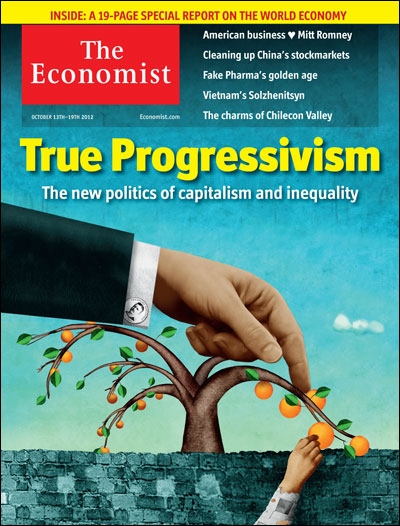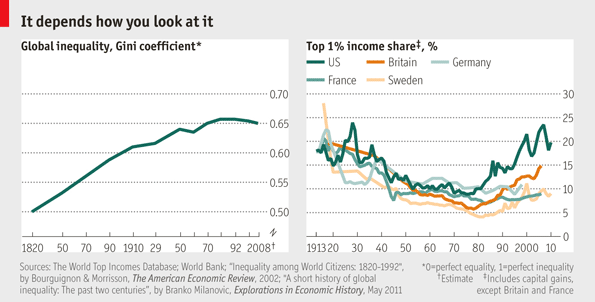Global inequality: before America ruled and when America ruled
 Thursday, October 18, 2012 at 9:49AM
Thursday, October 18, 2012 at 9:49AM 
No question we're heading for a globalized "progressive era" to match what America experienced at the end/turn of the 19th/20th centuries. Been talking that one for about five years now, and it was THE major theme of "Great Powers" back in 2009. Now the Economist joins in.
But this historical chart is interesting. Note the rising inequality across Europe's long colonial age (let's say 1800 to 1950) and then look at what happens when US-style globalization kicks in (1950-now): It slows, despite the ginormous wealth creation globally, and even flattens out and peaks across the period of its truest expression (1990-now).
To be sure, the 1% are slicing off too much wealth - just like during America's Gilded Age, thus my long-standing prediction of a necessary progressive era on a global scale led by coastal megacities (like NYC led ours and re-attempts to do so today with Bloomberg). But an interesting difference between how Europe ran the world and how we've managed to do it.

 Europe,
Europe,  US,
US,  US foreign policy,
US foreign policy,  globalization | in
globalization | in  Chart of the day |
Chart of the day |  Email Article |
Email Article |  Permalink |
Permalink |  Print Article
Print Article 









Reader Comments (3)
I'm wondering if there's a "break point". The article says that some theories believed inequality was good, as it provided disposable income and incentives for hard work, and then cites other theories that argue differently. So is there a point at which inequality stops being A Good Thing/incentive and starts being A Bad Thing/limitation?
Of course, I Am Not An Economist!
the real question is not "inequality" but the ability to live comfortably. It's the bottom ten percent: do they have enough to eat? Can their kids go to school? What about cellphones? a decent house bug free house?
I question the basis for the measurement of income inequality because it depends on income reporting - at least as far as the US is concerned, but I could probably guess it applies to other nations with relatively high - effective- taxation. For example, under the Eisenhower and Kennedy era top brackets, Congress had to introduce the 1969 AMT act because the IRS apparently reported that there were 50 super wealthy citizens who paid almost no taxes due to offshoring, deductions, and good old lawyers. You have a significantly more evidence to say that inequality was "squeezed" (on paper) only because high brackets influenced offshoring and deductions.
The best system in my determination is the old Henry George "single-tax" on land to replace them all. In effect, it will most likely be the most equitable tax system - which is why it is so unpopular - it's hard to offshore land, and the rich own "obscene" amounts of land, 2nd to the US gov. of course.